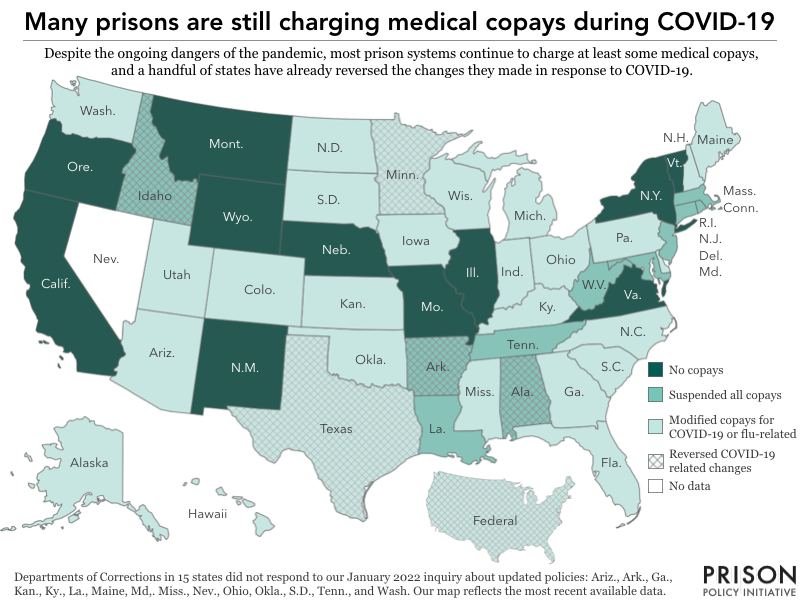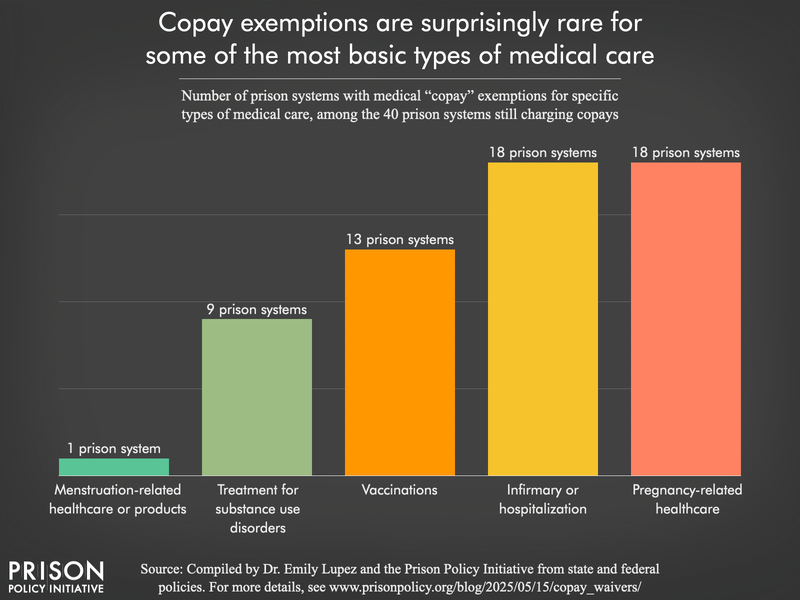At Sustainable Action Now, we fight for justice not only in the natural world—but within our social systems too. One of the most overlooked yet deeply harmful practices within the U.S. criminal justice system is the routine charging of medical copays to incarcerated individuals—a policy that criminalizes illness and denies essential care to society’s most vulnerable.
Recently, some prison systems have implemented policies that waive medical copays in certain situations. While this might sound like progress, the reality is far more troubling. Our review, along with critical insights from the Prison Policy Initiative, reveals that these waivers are narrow, inconsistent, and ultimately fail to repair the damage caused by a system that forces people to choose between pain and poverty.
👉 Learn more about the systemic injustice of prison healthcare policies in our Private Prisons section.
💰 What Are Medical Copays in Prison—and Why Do They Matter?
In many U.S. prisons and jails, people must pay copays for basic medical care, often ranging from $2 to $5 per visit. While that might not seem like much outside prison walls, inmates typically earn pennies per hour for labor—if they are paid at all. A single copay can amount to a week’s wages or more, creating a massive barrier to care.
This means incarcerated individuals often delay or avoid seeking medical attention for:
- Chronic illnesses like diabetes or asthma
- Severe pain or injury
- Mental health crises
- Infectious diseases (including COVID-19)
The result? Worsening health outcomes, higher risk of outbreaks, and preventable deaths.
🧾 Are Waivers Really Helping?
Several states have implemented copay waivers, meant to soften the impact. These waivers typically apply to:
- COVID-19-related symptoms
- Follow-up care from previous diagnoses
- Mental health services in some cases
However, our analysis shows that these policies are nowhere near sufficient. In fact, the waivers are so narrow, poorly communicated, and inconsistently enforced that they do little to change the reality on the ground.
“Policies for waiving medical copays in prisons are not enough to undo the harm caused by charging incarcerated people for health care access.” – Prison Policy Initiative
In many facilities, prisoners aren’t even told when they qualify for a waiver. In others, staff discretion can override policy, and there is little to no transparency or accountability.
This leads to:
- Missed diagnoses
- Increased suffering
- A chilling effect where people stop seeking care entirely
⚖️ Healthcare Is a Human Right—Not a Privilege Behind Bars
Denying or deterring medical care due to cost isn’t just inhumane—it’s a violation of human rights. The U.S. is one of the few countries where such practices are widespread, especially in a system already plagued by:
- Mass incarceration
- Racial disparities
- For-profit prison corporations
These copay policies disproportionately affect marginalized groups, particularly Black and Brown communities, who are overrepresented in the prison population and more likely to experience health disparities to begin with.
👉 Read more about the profit-driven policies behind incarceration in our Private Prisons feature.
📉 The Myth of Cost-Savings
Supporters of copays argue that they reduce frivolous medical visits and save taxpayer money. But this logic is deeply flawed:
- Incarcerated people don’t seek unnecessary care—they are often reluctant to seek any care at all due to stigma and fear.
- Preventive care is far cheaper than emergency treatment that results from delayed visits.
- Outbreaks caused by ignored symptoms (e.g., COVID, flu, MRSA) result in much higher costs for prison systems and public health agencies alike.
In short: Charging for care causes harm without saving money. It is punitive, not preventative.

🔁 The Cycle of Harm: Health, Recidivism, and Reentry
Access to healthcare is essential for rehabilitation and successful reintegration into society. When incarcerated individuals are denied that access:
- Chronic conditions go untreated, worsening over time.
- Mental health issues become more severe, sometimes leading to violence or suicide.
- People leave prison sicker than when they entered, with no support system waiting.
This directly increases the risk of recidivism—the cycle of release and re-incarceration that keeps prisons full and lives destroyed.
📢 What Needs to Change
We must go beyond cosmetic reforms and eliminate medical copays in prisons altogether. Here’s what justice-centered prison healthcare reform should include:
- ✅ Universal access to medical and mental health care, with no financial barriers
- ✅ Independent oversight to ensure waivers and services are applied fairly
- ✅ Investment in prison healthcare infrastructure, including qualified staff and telemedicine
- ✅ Support for reentry healthcare, so individuals don’t fall through the cracks upon release
A system that punishes people for being poor, sick, or traumatized does not serve public safety—it perpetuates injustice.
💪 How You Can Help
- Raise awareness about this issue by sharing stories and reports like this one.
- Contact lawmakers and demand legislation to eliminate prison copays at the state and federal level.
- Support organizations like the Prison Policy Initiative, and advocate for prison healthcare reform.
- Donate to reentry programs that help formerly incarcerated people access medical and mental health care.

🧭 The Path Toward Humane Justice
Charging incarcerated people for medical care is not just unfair—it’s cruel. These copays punish poverty, worsen public health, and reinforce a system of exploitation that benefits private prison contractors and hurts everyone else.
It’s time to put compassion and evidence-based policy at the heart of our justice system. Not band-aid waivers. Not vague reforms. But real, systemic change.
🔗 For more on how the prison-industrial complex profits off suffering, explore our in-depth coverage here: Private Prisons
Healthcare should heal—not harm. It’s time to abolish medical copays in prisons once and for all.
— Sustainable Action Now


